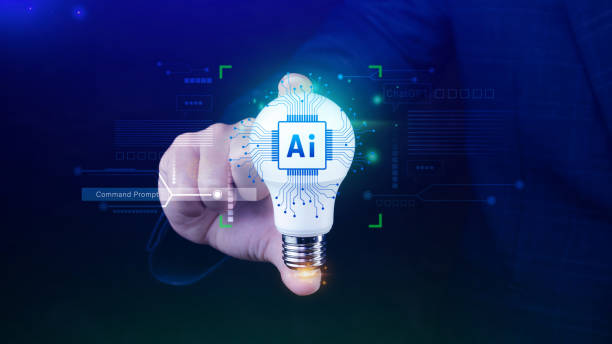What is Artificial Intelligence and How Does It Work?
Artificial Intelligence (AI) is a branch of computer science that deals with building machines capable of performing tasks that typically require human intelligence.
These tasks include learning, problem-solving, pattern recognition, natural language understanding, and decision-making.
Artificial intelligence attempts to mimic human cognitive processes.
For this purpose, it uses various algorithms and models.
Machine Learning algorithms enable machines to learn from data without explicit programming.
These algorithms analyze data and identify patterns that can be used for prediction or decision-making.
Machine learning itself is divided into different categories such as supervised learning, unsupervised learning, and reinforcement learning.
Artificial Neural Networks are another key tool in artificial intelligence.
These networks are inspired by the structure of the human brain and consist of multiple layers of interconnected nodes.
Each node is an artificial neuron that receives, processes, and sends information to other nodes.
Neural networks can be used for image recognition, natural language processing, and other complex tasks.
Developers are using #artificial_intelligence techniques to build systems that are not only intelligent but also capable of learning and adapting to new conditions.
Did you know that poor online store design can drive away up to 70% of your potential customers? Rasaweb transforms your sales with professional and user-friendly online store designs.
✅ Significant increase in sales and revenue
✅ Fully optimized for search engines and mobile
⚡ [Get free advice from Rasaweb]
Types of Artificial Intelligence – From Expert Systems to Deep Learning
Artificial intelligence can be divided into different categories based on its abilities and functions.
Expert Systems use specialized knowledge to solve specific problems.
These systems usually consist of a knowledge base and an inference engine that allows them to reach conclusions using logical rules.
Deep Learning is a subset of machine learning that uses deep neural networks to learn from data.
Deep neural networks have multiple layers that allow them to identify complex patterns in the data.
Deep learning has performed very well in areas such as image recognition, natural language processing, and speech recognition.
Deep learning, by using a huge amount of data, is able to discover hidden patterns and make accurate decisions.
Other types of artificial intelligence include robotics and machine vision systems, each of which has many applications in various industries.
Narrow AI, also known as weak AI, is designed to perform a specific task.
Most current artificial intelligence systems are of this type.
General AI, or strong AI, has the ability to perform any task that a human can perform.
Achieving general artificial intelligence is still a major challenge in this field.
Applications of Artificial Intelligence in Everyday Life and Various Industries
Artificial Intelligence is increasingly penetrating everyday life and various industries.
In everyday life, artificial intelligence is used in virtual assistants such as Siri and Alexa, recommendation systems in streaming platforms, and email spam filters.
In the healthcare industry, artificial intelligence is used to diagnose diseases, develop drugs, and provide personalized healthcare.
Artificial intelligence in the field of health, by analyzing medical data and radiology images, helps doctors in more accurate and faster diagnosis of diseases.
In the financial industry, artificial intelligence is used for fraud detection, risk management, and automated financial services.
In the transportation industry, artificial intelligence is used to develop self-driving cars and optimize transportation routes.
In the manufacturing industry, artificial intelligence is used for process automation, quality control, and equipment failure prediction.
These are just a few examples of the wide range of applications of artificial intelligence.
With rapid advances in this field, the applications of artificial intelligence are expected to become broader and more diverse in the future.
| Industry | Application of Artificial Intelligence |
|---|---|
| Healthcare | Disease diagnosis, drug development |
| Finance | Fraud detection, risk management |
| Transportation | Self-driving cars, route optimization |
Click here to preview your posts with PRO themes ››
Advantages and Disadvantages of Using Artificial Intelligence
Using Artificial Intelligence has many advantages.
Artificial intelligence can increase efficiency and productivity, reduce human errors, and enable tasks that are impossible or dangerous for humans.
Artificial intelligence can help solve complex problems and make better decisions.
However, using artificial intelligence also has disadvantages.
Developing and deploying artificial intelligence systems can be expensive.
Also, the use of artificial intelligence can lead to job losses as machines replace human labor.
There are also ethical concerns about the use of artificial intelligence, especially regarding privacy, discrimination, and accountability.
One of the main challenges is maintaining data privacy when using artificial intelligence algorithms.
Also, automated decision-making by artificial intelligence can lead to discrimination, especially if the training data contains biases.
Accountability for artificial intelligence decisions is also a complex issue, as it is difficult to determine who is responsible for the unintended consequences of an artificial intelligence system.
Does your current corporate website reflect your brand’s credibility and power as it should? Rasaweb solves this challenge for you with professional corporate website design.
✅ Increase the credibility and trust of visitors
✅ Targeted attraction of more customers
⚡ Click to get free advice!
Ethical and Social Challenges of Artificial Intelligence
Artificial Intelligence faces important ethical and social challenges.
One of these challenges is the issue of discrimination.
Artificial intelligence algorithms can learn the biases present in training data and repeat them in their decisions.
This can lead to discrimination against certain groups of people.
Another challenge is the issue of privacy.
Artificial intelligence systems often require large amounts of personal data to work effectively.
Collecting and using this data can raise privacy concerns.
Also, there is a possibility that artificial intelligence systems will be used to monitor or manipulate people.
The issue of accountability is also an important challenge.
If an artificial intelligence system makes a mistake, it is difficult to determine who is responsible.
Should the developer, the user, or the system itself be held responsible? These are questions that still have no definitive answers.
The Future of Artificial Intelligence – What to Expect?
Artificial Intelligence is advancing rapidly and is expected to play an even greater role in our lives in the future.
In the future, we will see the development of more complex and powerful artificial intelligence systems.
These systems will be able to perform tasks that currently seem impossible for machines.
Artificial intelligence is expected to create fundamental transformations in fields such as medicine, education, transportation, and manufacturing.
Self-driving cars, personalized virtual assistants, and surgical robots are just a few examples of innovations that can change our lives in the future.
However, it is important to pay attention to the ethical and social challenges of artificial intelligence as well.
We must ensure that artificial intelligence is used responsibly and for the benefit of society.
Creating appropriate laws and regulations for the use of artificial intelligence, and educating and informing people about this technology, are among the measures that can help us in this regard.
Machine Learning and its Role in Artificial Intelligence
Machine Learning is one of the main sub-branches of Artificial Intelligence and plays a very important role in the development of intelligent systems.
Machine learning enables machines to learn from data and improve their performance without explicit programming.
This process involves the use of algorithms and statistical models to identify patterns and relationships in data.
Machine Learning allows artificial intelligence systems to increase their knowledge and make better decisions with experience.
Click here to preview your posts with PRO themes ››
Machine learning algorithms are divided into different categories, including Supervised Learning, Unsupervised Learning, and Reinforcement Learning.
In supervised learning, the machine is trained using labeled data.
In unsupervised learning, the machine tries to identify patterns in unlabeled data.
In reinforcement learning, the machine learns how to maximize reward by interacting with its environment.
Machine learning is used in various fields such as image recognition, natural language processing, prediction, and recommenders.
With rapid advances in this field, machine learning is expected to play an even greater role in the future of artificial intelligence.
| Learning Type | Description |
|---|---|
| Supervised Learning | Training with labeled data |
| Unsupervised Learning | Identifying patterns in unlabeled data |
| Reinforcement Learning | Learning through interaction with the environment |
Natural Language Processing (NLP) and Human-Machine Interaction
Natural Language Processing (NLP) is a branch of Artificial Intelligence that enables machines to understand and interact with human language.
NLP includes tasks such as machine translation, sentiment analysis, text summarization, and question answering.
NLP allows #Artificial_Intelligence systems to communicate with humans naturally and effectively.
NLP uses various algorithms and models to process language.
These algorithms can analyze words, sentences, and language structures and extract their meaning.
NLP is used in various fields such as virtual assistants, chatbots, and machine translation systems.
With rapid advances in this field, NLP is expected to play an even greater role in human-machine interaction.
One of the main challenges in NLP is understanding the ambiguity and complexity of human language.
Human language often has ambiguity, metaphor, and humor that are difficult for machines to understand.
However, with the development of new algorithms and the use of more data, NLP is constantly improving and is able to better understand human language.
Does your company website make a professional and lasting first impression on potential customers? Rasaweb, with professional corporate website design, not only represents the credibility of your brand, but also opens a path for the growth of your business.
✅ Create a powerful and reliable brand image
✅ Attract target customers and increase sales
⚡ Get free advice
Computer Vision and Understanding Images by Computers
Computer Vision is a branch of Artificial Intelligence that enables computers to understand images and extract useful information from them.
Computer vision includes tasks such as object recognition, face recognition, and scene analysis.
Computer vision allows artificial intelligence systems to see and understand the world around them.
Computer vision uses various algorithms and models to process images.
These algorithms can identify patterns and features in images and use them to recognize objects and analyze scenes.
Computer vision is used in various fields such as self-driving cars, security cameras, and face recognition systems.
One of the main challenges in computer vision is changes in lighting, viewing angle, and occlusion.
These changes can make it difficult for computers to recognize objects.
However, with the development of new algorithms and the use of more data, computer vision is constantly improving and is able to better understand images.
How to Learn Artificial Intelligence? – Learning Resources and Paths
Learning Artificial Intelligence requires a systematic approach and the use of reliable resources.
First, you need to be familiar with the basic concepts of mathematics and computer science.
Linear algebra, statistics, and probability are among the important topics that you should master.
Also, you should be familiar with programming languages like Python, because Python is one of the most popular languages for developing artificial intelligence systems.
After getting acquainted with the basic concepts, you can start learning machine learning algorithms.
There are many online resources for learning machine learning, including online courses, video tutorials, and textbooks.
Also, you can participate in practical projects to gain practical experience.
Click here to preview your posts with PRO themes ››
To learn artificial intelligence, you can use the following resources: online courses, university textbooks, scientific articles, and open-source projects.
Also, participating in online communities and artificial intelligence events can help you learn and network.
tensorflow is one of the developer languages in this field.
Frequently Asked Questions
| Question | Answer |
|---|---|
| What is the definition of Artificial Intelligence (AI)? | It is a field in computer science that aims to create intelligent machines that can think, learn, solve problems, and make decisions like humans. |
| Mention some common AI applications. | They include self-driving cars, voice assistants (such as Siri and Alexa), recommendation systems (such as Netflix and Amazon), facial recognition, and medical diagnosis. |
| What is the difference between Narrow AI (ANI) and General AI (AGI)? | Narrow AI is specialized in a single and specific task, while General AI possesses human intellectual ability to perform any cognitive task. |
| What is Machine Learning and its relationship to Artificial Intelligence? | Machine learning is a branch of artificial intelligence that focuses on developing algorithms that allow systems to learn from data without explicit programming. |
| What are Artificial Neural Networks? | They are computational models inspired by the structure and function of the human brain, and are used in deep learning to process data and discover complex patterns. |
| Mention some ethical challenges related to AI. | They include privacy issues, bias in data and algorithms, job loss, and liability in the event of errors or unfair decisions. |
| What is Natural Language Processing (NLP)? | It is a branch of artificial intelligence that focuses on enabling computers to understand, interpret, and generate human language in a useful and interactive way. |
| How can AI affect the labor market? | It can lead to the automation of some routine tasks, requiring workers to be retrained and creating new jobs in the fields of designing, developing, and maintaining AI systems. |
| What is Computer Vision? | It is a field in artificial intelligence that enables computers to “see”, understand, and interpret images and videos in the same way that humans do, enabling them to recognize objects and faces. |
| What is the importance of data in developing AI systems? | Data is the fuel that feeds artificial intelligence systems, especially in machine learning. The quality and quantity of data significantly affect the accuracy and performance of the models and their ability to learn and make correct decisions. |
And other services of Rasa Web Advertising Agency in the field of advertising
Intelligent Custom Software: An effective tool to attract customers with the help of SEO-oriented content strategy.
Intelligent Content Strategy: An exclusive service to increase the click-through rate based on user experience customization.
Intelligent UI/UX: A fast and efficient solution for user interaction with a focus on attractive user interface design.
Intelligent Sales Automation: A combination of creativity and technology to improve SEO ranking through SEO-oriented content strategy.
Intelligent Custom Software: A combination of creativity and technology for digital branding through user experience customization.
And more than hundreds of other services in the field of internet advertising, advertising consulting and organizational solutions
Internet Advertising | Advertising Strategy | Advertisement Report
Resources
How does artificial intelligence transform human rural relations and other robot professions?
,The trend of artificial intelligence supports student startups
,Artificial intelligence infrastructure and expectations
,Artificial intelligence, a new tool for therapeutic advances
? With Rasaweb Afarin, your business shines in the digital world! With our expertise in key areas of digital marketing, including multilingual website design, search engine optimization (SEO), and professional social network management, we are ready to take your brand to the top.
📍 Tehran, Mirdamad Street, next to the Central Bank, South Kazerun Alley, Ramin Alley No. 6
“`














